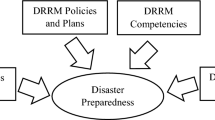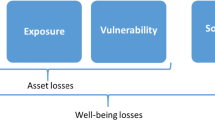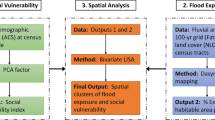Abstract
This paper presents a case study of Robeson County’s challenges in addressing the double-barrel disasters of Hurricane Matthew in 2016 (Category 5) and Hurricane Florence in 2018 (Category 4) in conjunction with the economic disaster resulting from the loss of over 10,000 jobs in the county following the passage of the North American Free Trade Agreement (NAFTA). It is well known that climate disasters, including major hurricanes, droughts, and forest fires, worsen existing economic and social conditions. The significant challenges to recovery created by these combined disasters are salient. Both the patterns of the global economy and public and private disaster systems create a “disaster diaspora” within low-income impacted communities and poor rural communities impacted by major economic and climate change. Both economic and climate disruption have led to massive displacement within impacted communities leading to economic and social instability. Robeson County and all of Eastern North Carolina provide a case study for “disaster diaspora”, including its systemic patterns, causes, and indicators as well as potential solutions. This paper identifies, recognizes, and details this challenge, asserting that both existing patterns of economic and social disparity must be addressed along with and at the same time, as climate disaster recovery. The disproportionate and ongoing impact of NAFTA on Robeson County, Eastern NC, and all of rural America has not been effectively mitigated or significantly redressed. This paper offers a theoretical connection between climate disaster and economic dislocation and the necessary challenge of addressing and reconstructing both at the same time.

Similar content being viewed by others
Notes
A dissociative disorder is characterized as a disconnection and/or lack of continuity between thoughts, memories, and surroundings. Disaster victims escape reality in ways that are involuntary and unhealthy and cause problems in everyday life.
References
American Psychiatric Association (2013) Diagnostic and statistical manual of mental disorders, 5th edn. Author, Arlington, VA
Bigelow, Scott (2019) Board votes to close south Robeson high school, 4 other schools. Robesonain (2019). Retrieved from: https://www.robesonian.com/news/124338/board-votes-to-close-south-robeson-high-4-other-schools
Bradley, D. (2018) Report: 70% of Robeson children in poverty. Robesonian https://www.robesonian.com/news/109393/report-70-of-robeson-children-in-poverty
Brown T (2020) Neighbors urge NCDOT to fix flooding problem on Robeson county road. ACC 15 news. Retrieved from: https://wpde.com/news/local/neighbors-urge-ncdot-to-fix-flooding-problem-on-robeson-county-road
Calver S (2018) The worst hurricanes to hit the carolinas. The wall street journal https://www.wsj.com/articles/the-worst-hurricanes-to-hit-the-carolinas-1536744601
Campbell C (2018) Lumberton didn’t fix a big weakness before Florence. So residents tried a DIY defense Retrieved from: https://www.newsobserver.com/news/politics-government/article218692775.html#storylink=cpy
Committee on post-disaster recovery of a community’s public health, medical, and social services; board on health sciences policy; institute of medicine (2015) Healthy, resilient, and sustainable communities after disasters: strategies, opportunities, and planning for recovery. National Academies Press, Washington, DC
Data USA: Robeson county NC. 2017. Retrieved from: https://datausa.io/profile/geo/robeson-county-nc/
Dückers MLA, Thormar SB, Juen B, Ajdukovic D, Newlove-Eriksson L, Olff M (2018) Measuring and modelling the quality of 40 post-disaster mental health and psychosocial support programmes. PLoS ONE 13(2):1–17
Fofaria, R. (2019). For Robeson county, hurricane florence is the story of two storms. EDNC, https://www.ednc.org/2019/09/04/for-robeson-county-hurricane-florence-is-the-story-of-two-storms/
Henderson, J. (2019). Recovery slow for Robeson county residents flooded out from Florence. Fayetteville observer, Retrieved from: https://www.fayobserver.com/news/20190914/recovery-slow-for-robeson-county- residents-flooded-out-from-florence
HMRRP-RC (2017) Hurricane Matthew resilient redevelopment plan: Robeson county–draft. https://files.nc.gov/rebuildnc/documents/matthew/rebuildnc_robeson_plan_combined.pdf
Hossfeld L, Legerton M, Kuester G (2004). The economic and social impact of job loss in Robeson county, NC. 1993–2003. Sociation today, 2(2): Retrieved from: http://www.ncsociology.org/sociationtoday/v22/hossfeld.htm
Hunter TC (2019). Work begins Monday to clear debris from Lumber river. The Laurinburg exchange. Retrieved from: https://www.laurinburgexchange.com/news/28193/work-begins-monday-to-clear-debris-from-lumber-river
Kar N, Mohapatra PK, Nayak KC, Pattanaik P, Swain SP, Kar HC (2007) Post-traumatic stress disorder in children and adolescents one year after a super-cyclone in Orissa, India: exploring cross-cultural validity and vulnerability factors. BMC Psychiatry 7:8–9
Keenan JM, Hill T, Gumber A (2018) Climate gentrification: from theory to empiricism in Miami-Dade County, Florida. Environ Res Lett. https://doi.org/10.1088/1748-9326/aabb32/meta
Kepler, L. (2017). What is climate gentrification? GreenBiz, Retrieved from https://www.greenbiz.com/article/what-climate-gentrification
Legerton, M. (2017) Relief from Hurricane Irma, community style. Fayetteville observer. Retrieved from: http://www.fayobserver.com/opinion/20170909/mac-legerton-relief-from-hurricane-irma-community-style
Ling, D. (2019). Community resilience is key to disaster recovery, but many are unprepared (Study). Property casualty 360: Retrieved from https://www.propertycasualty360.com/2019/03/27/community-resilience-is-key-to-disaster-recovery-but-many-are-unprepared-study-warns/
Manzoor S, Ali M (2018) Disaster and mental health: A need for multipronged approach. Indian J Health Wellbeing 9(3):483–488
Marson SM, Lillis JP (2019) Durkheim’s greatest blunder. J Sociol Soc Welf 46(2):155–177
Martín C (2018). Urban wire: neighborhoods, cities, and metros. The blog of the Urban institute, Retrieved from https://www.urban.org/urban-wire/five-ways-households-are-left-behind-disaster-recovery-and-data-supply-chain
Murrough J, Horn SW (2014) Unemployment biggest predictor of ptsd symptom severity. Medscape, Retrieved from: https://www.medscape.com/viewarticle/824747
NCDOT (2019, July 7). NCDOT Planning to Widen I-95 in Robeson, Cumberland Counties. Retrieved from: https://www.ncdot.gov/news/press-releases/Pages/2019/2019-07-11-ncdot-widening-proposal-i-95-robeson-cumberland.aspx
North Carolina Judicial Branch. (2019). Unclaimed property by county (Robeson): Listings of unclaimed property by county provided annually by the State Treasurer’s Office. Retrieved from: https://www.nccourts.gov/documents/publications/unclaimed-property-by-county
Rives, K. (2002, Aug 18). NAFTA's impact on north Carolina. Raleigh news and observer https://faculty.chass.ncsu.edu/slatta/hi453/PS/Latinos/nafta1.htm
Rosellini AJ, Dussaillant F, Zubizarreta JR, Kessler RC, Rose S (2018) Predicting posttraumatic stress disorder following a natural disaster. J Psychiatr Res 96:15–22
Steinglass P, Gerrity E (1990) Natural disasters and post-traumatic stress disorder short-term versus long-term recovery in two disaster-affected communities. J Appl Soc Psychol 20:1746–1765
Stillweli K (2019). Two overlooked factors in disaster recovery. risk management, Retrieved from: http://www.rmmagazine.com/2019/06/01/two-overlooked-factors-in-disaster-recovery/
Stradling R (2018) More than a month after Hurricane Florence devastated NC, the deaths continue. The Raleigh news and observer, Retrieved from: https://www.newsobserver.com/news/local/article220945805.html.
Sutten T, Borchik B (2017) Running the numbers: an overview of north Carolina Medicaid and health choice. N C Med J 78(1):58–62
Tester B (2018) Up in smoke: Tobacco’s decline. The Robesonian https://www.robesonian.com/news/109907/109907
Author information
Authors and Affiliations
Corresponding author
Ethics declarations
Conflict of interest
The authors declare that there are no conflicts of interest.
Additional information
Publisher's Note
Springer Nature remains neutral with regard to jurisdictional claims in published maps and institutional affiliations.
Rights and permissions
About this article
Cite this article
Marson, S.M., Legerton, M. Disaster diaspora and the consequences of economic displacement and climate disruption, including Hurricanes Matthew (October 8, 2016) and Florence (September 14, 2018) in Robeson County, North Carolina. Nat Hazards 107, 2247–2262 (2021). https://doi.org/10.1007/s11069-021-04529-8
Received:
Accepted:
Published:
Issue Date:
DOI: https://doi.org/10.1007/s11069-021-04529-8




